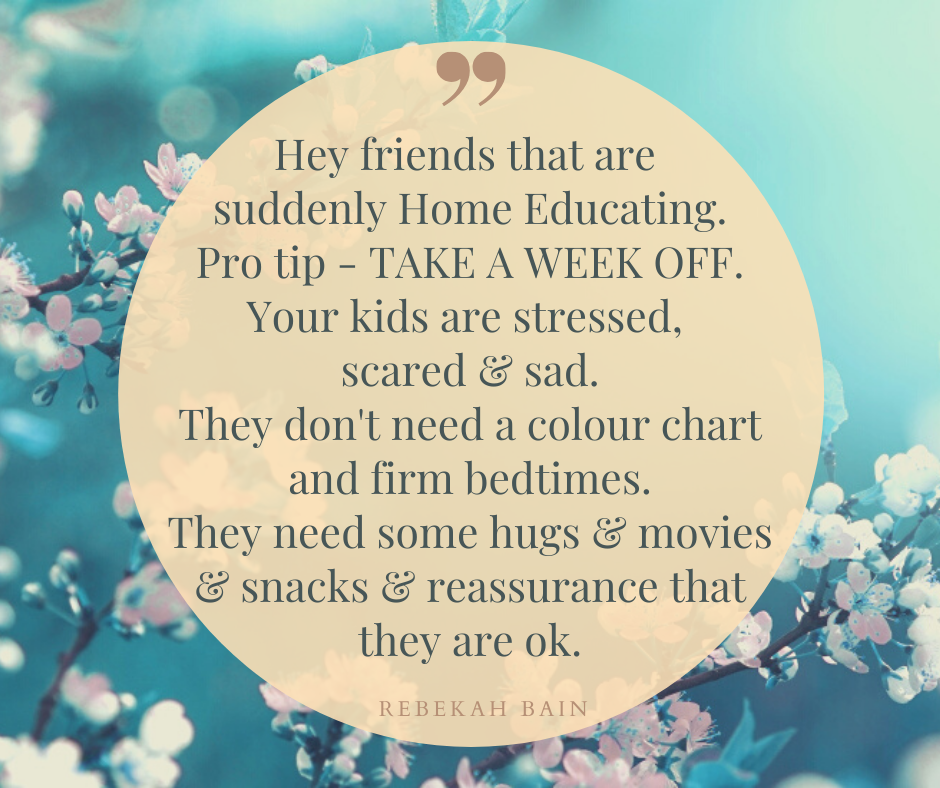Dear every single parent in my timeline madly trying to recreate school at home, with highly structured schedules & worksheets: please stop!
Schools teach in this manner because they have to keep 30-odd kids sorted at the same time. It’s basically crowd control, and not designed this way because it’s the best way to learn!
You have such a rare and brilliant opportunity here – please don’t be afraid of it. This is not going to be as hard or painful as you think right now. You’re going to love it, I promise.
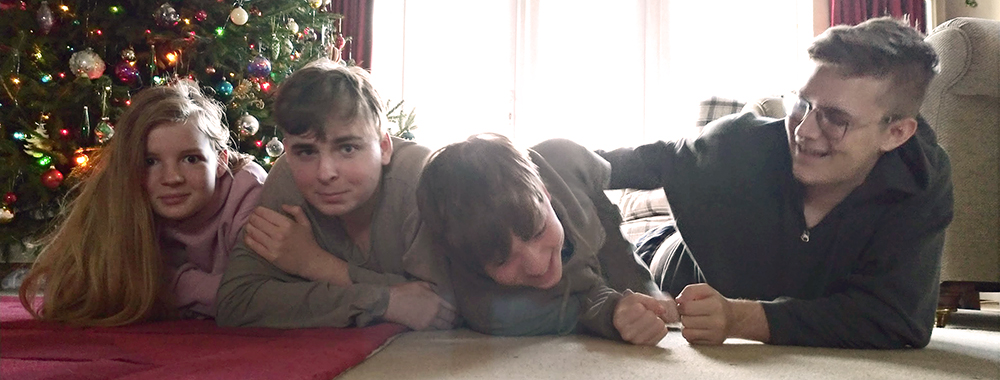
(every three years I recreate this photo – Bear was 3 the first time I took it. They’re supposed to replicate the first one. Every year someone messes it up and I have to take about 20…)
I recommend reading this on the Montessori method – it has natural foundations in the way we instinctively learn. Just think about the way you learn as an adult – do you decide that in order to learn something you need a classroom and a teacher? No. You will read articles, watch videos, ask questions in forums – you learn organically by following your own curiosity. Children want to learn the same way!
I’ve been home educating for seven years now – my youngest was six when we began, my oldest was 14. They’re articulate, rounded, have passed exams and the oldest has moved into a successful tech career. We’ve done this pretty successfully for quite some time – and I took a LOT of advice from people who have been doing it for far longer.
Honestly? I’ve been getting a bit fed up with all the ‘THIS is how you homeschool!’ posts in my timeline from people who’ve been doing it for a grand total of 0 days.
But then I remembered how unsure, worried and overwhelmed I felt setting out on home educating my four kids – and I had actively chosen to do this.
So. Firstly – I’m going to do the unthinkable. Here it is.
If you want to – ignore the teachers’ timetable.
I know. Shocker.
Remember that 1-on-1 study time is far more intense and productive than a class of 30 settling down to a task.
2.5hrs of solo study is the equivalent of a full day in school; so do let them take time off. They’ll feel fresher, and will be more willing to work. Obviously older teens can set their own hours, and should be totally up to a full day of organised study – just provide snacks and distractions as necessary, just as you would were they doing revision from home during study leave.
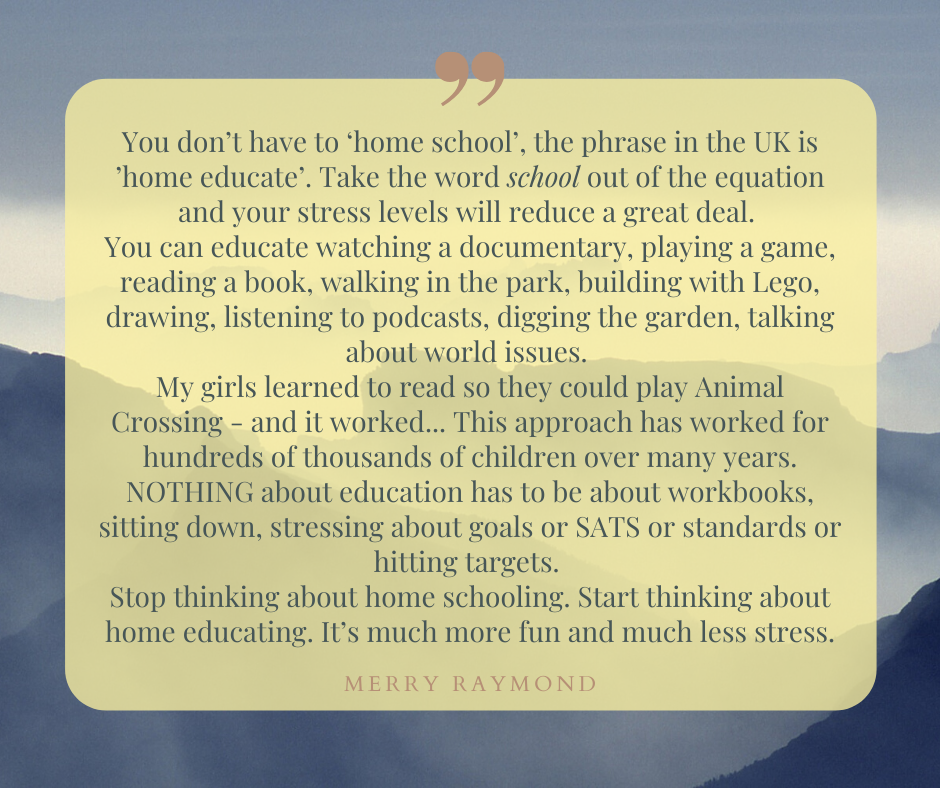
But for younger kids, I’ve laid out below the way lots of Home Ed parents cover the curriculum basics (and no, what you’re doing isn’t really ‘Home Educating’. Being socially distant is not how it works, we go out and socialise a LOT. This is new to us too!).
The thing to remember is that all Home Educating families do it differently – there’s no right or wrong way – the really important thing here is to work out what is right for you.
Some kids love a timetable and to sit with a workbook, for others this is their actual picture of hell. Don’t fight the tide – be flexible, set aside all your own notions of how it ‘should‘ be, and go with what works.
Science
Go for a walk – yes, currently you can still do that as long as you’re not self-isolating – just make sure it’s in a wide public space and you maintain social distancing. You can discuss photosynthesis, the water cycle, collect leaves, photograph bugs, sort clouds, record the weather.
In the home do some baking – there’s a great Instructables series of lessons on the science of baking here; find out why bread rises, why we use fats, why the order of ingredients can matter.
Look online for fun science experiments – simply getting in the garden with some mentos and some cheap lemonade is brilliant.
Try Science Sparks for all the science info and experiments you’ll ever need.
English
Read! I’ve seen a lot of families set aside half an hour’s reading time daily, where the whole family stops and curls up with a book. This is a brilliant idea! It’s not a ‘lesson’ if we’re all doing it, it’s just ‘quiet time’.
Don’t fret about what they’re choosing to read, either; literally any words are good, whether it’s comics or a car manual. My youngest son didn’t like stories (oh, the sadness), but used to read endless non-fiction books on vehicles.
Chat about your stories. Explain them to each other, say what you like, what you don’t, how it makes you feel, words the author used which you didn’t know or that you particularly like.
Play word games – anagrams, crosswords, hangman, scrabble, bananagrams. There are loads of free apps for the tablet or phone (Techradar did a round up for Android here) , or just do it the old-fashioned way with pen and paper.
Write stories! We often do writing competitions where they have a time limit and three random objects as prompts which they must include. They could construct a comic, write a whole book – older kids could complete a manuscript or childrens book and submit them to an agent.
Don’t worry about appropriate use of adverbs and subjunctive pronouns. Just get them to write until it flows and they can express what is in their brain through their fingers.
Listen to audiobooks – proven to increase vocabulary and innate understanding of language, and a brilliant way to access tricker books and mature themes. I’ve written about this before – you can read my love letter to audiobooks here, which is rammed full of personal recommendations.
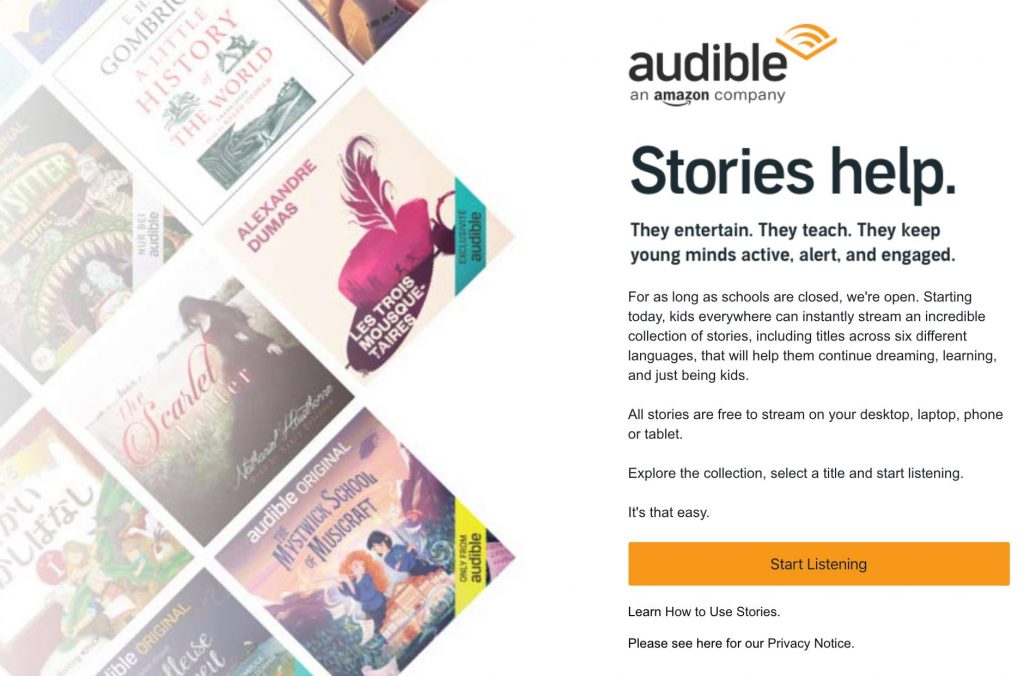
Audible are offering a library of children’s audiobooks totally for free.
In a time when kids could be lying in the dark and worrying once you’ve kissed them goodnight, going to sleep listening to the soothing sounds of a favourite story could make a huge difference. The free library is handily divided into age ranges, and there’s a big teen section, as well as ‘the classics’ which has some gems like Thandie Newton reading Jane Eyre, Dan Stevens reading Frankenstein, all the Austens and full-cast Shakespeares.
Music
If your child plays an instrument, let them play! Let them write their own music, too. And if they don’t play? Well – there’s loads of online tutorials if you have an instrument in the house (and if you don’t, a Ukelele isn’t expensive and a great place to start!).
If you’re not instrument-minded, then start a singing hour! Sing together, take turns to choose songs – my daughter adores the free Smule app where they can sing with others and get sociable too. Frankly she was hooked as soon as she discovered there are thousands of similiarly Hamilton-obsessed people out there; she’s learned the entire score, and sings duets, solos and group songs almost daily.

Art
Paint, draw, sketch, mould, paint, sketch, print, paint, carve, draw, PAINT! My daughter will often use her digital art tablet and draw from breakfast through to dinner. One of her favourite things about not being in school is that she has unrestricted freedom to just keep drawing – there’s no timetabled lesson that will make her sit and do her maths because that’s what the timetable says. If your child loves art, let them do art!
There are countles online lessons, courses and resources. And yes, digital art is just as important and good as ‘real’ paints and lessons; don’t force them to do what you think is the ‘best’ art, let them do what comes naturally.
For research, use Google Arts & Culture to explore the world’s finest Art Galleries and Museums, from the Louvre to the Frida Kahlo Museum.
PE
Learn a TikTok dance. Follow the 100 press up challenge. Do Yoga with Adriene, or a Joe Wickes’ live Monday workout for kids. Go into the garden and make an obstacle course, create a circuits course, or just do 15 minutes with a skipping rope.
History
There’s so much online for History buffs! You can do virtual tours of most of the words great museums, use Google Arts & Culture again to explore the British Museum in London, the Guggenheim in New York City, and literally hundreds of more places.
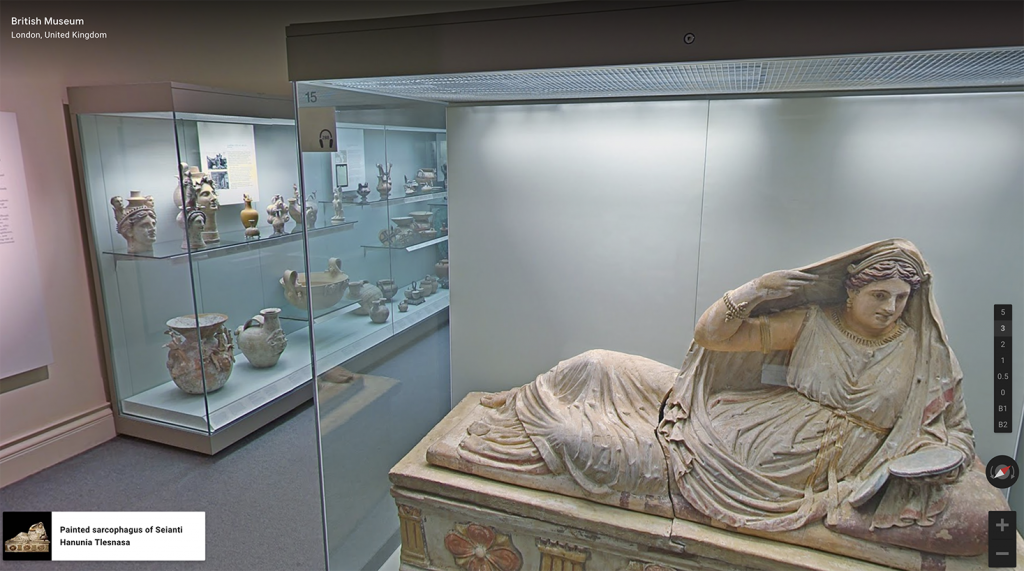
The Ancient History Encyclopedia is a rabbit hole of easy-to-read articles, and the editorial team’s academic excellence is highly respected.
If your kids are into playing games on the PC, then I strongly suggest you invest in Sid Meier’s Civilization V (don’t bother with the expensive newer VI version, Civ V is better). The basic game is under £20 on Steam, but my teens suggest you splash out on the full bundle for £32 if you can. My kids have learned so much from this game alone – they’re experts in various ancient cultures & geography, and they beat us every Christmas at various quizzes thanks to the knowledge they’ve picked up purely while playing this game together for hours.
Tutorful have published a great round up of websites and apps crammed full of History resources.
And please don’t forget to watch every episode of Horrible Histories – all available on the iPlayer – probably the sole reason our entire family love History as much as they do.
And of course any historical film is worth watching for family movie night – whether you’re looking at the abolitionists and slavery, WWII, the Tudors or the Romans in Britain, there’s a movie out there about it.
Maths
Okay, this one you might need some workbooks or an online maths course. For practical applications you can set up a shop, and have older kids buy & sell things from you – combine it wkith your baking and halve/double the recipe…
The Khan Academy have an amazing range of free resources and daily lessons for all age groups, the BBC’s Bitesize is always worth bookmarking, and EDX offer free online maths courses from MIT, ASU, and other leading math and science institutions.
Language
It doesn’t have to be French or German – my kids have studied Japanese, Norwegian, Latin and Greek. Just because they could. And every time they look at new language structures, their understanding and communication expands in every language, including their own. There are lots of free resources – Duolingo is a great place to start; it’s free, has 5 minute daily lessons – just let them choose the language that takes their fancy
Also, watching foreign-language films can really help. For years people around the world have learned English by watching Hollywood movies and costume dramas on the BBC – did you know that Netflix has a sofa-based language lab? Language Learning With Netflix (LLN) allows viewers to watch foreign language shows with subtitles both in the original language and English, and pauses automatically to allow the learner to absorb what they have just heard.
There’s a great round up of the best of Interntaional Film on the BBC site, and there’s a plentiful supply of them on Netflix – the Spectator picked its favourites here.
If you don’t know any of the things you want to teach – learn them too! Kids love it when you say “I have no idea, let’s find out!”, and you can discover the subject together.
Just remember that for most schooled children this is an amazing opportunity where they can step outside the necessary timetable boundaries of their normal education, and enjoy some self-directed deep learning. Enjoy it!
It’s ok not to cover everything every day. It’s okay to take the day off. A couple of things, done with purpose and interest, are far more beneficial in the long run. And remember that while we all love a structure to our days, micro-managing every hour isn’t good for them OR you! Longer projects with art equipment or story writing will also leave you free to turn to your own jobs and work.
